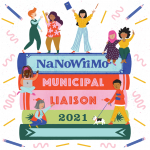The Stonewall Riots in June of 1969 are what kicked off the modern equality movement. There were organizations, riots and work done beforehand, but the riots were what most people point to as the catalyst for where we are today, and the reason most Pride celebrations are in June, as the first march was in June of 1970 to commemorate the riots one year later.
Here is the poster, which kind of looks like a poster for a dance movie or some sort, but I think the style fits for the time:

The Stonewall Inn had a dirt floor, no running water, and was run by the mob. But it allowed dancing, which was a major draw, when the police raided that night and decided to round everyone up, the riots started.
The riots lasted for days, eventually bringing in sheer numbers of people from the surrounding neighborhood. But that night it began with drag queens, trans* people, people of color, lesbians and homeless youth. I’m sure there were some white gay men there, but as far as we (and history) knows, they weren’t throwing the first punches, bricks, overturning police cars or ripping parking meters out of the cement (but those did all happen).
The problem is, the movie (at least based on the trailer), doesn’t focus on those we owe everything to, but instead turns it into a story of some young, white, gay guys.
One of the veterans of the riots speaks out:
It’s absolutely absurd — you know, young people today aren’t stupid. They can read the history, they know that this is not the way it happened. These people can’t let it go! Everybody can’t be white! This is a country of different colors and people and thoughts and attitudes and feelings, and they try to make all of those the same for some reason.
Here’s the parody trailer, which sums it up very nicely:
The star, Jeremy Irvine defends the movie, saying it does justice to the historical event:
I saw the movie for the first time last week and can assure you all that it represents almost every race and section of society that was so fundamental to one of the most important civil rights movements in living history. Marsha P Johnson is a major part of the movie, and although first hand accounts of who threw the first brick in the riots vary wildly, it is a fictional black transvestite character played by the very talented @vlad_alexis who pulls out the first brick in the riot scenes. My character is adopted by a group of street kids whilst sleeping rough in New York. In my opinion, the story is driven by the leader of this gang played by @jonnybeauchamp who gives an extraordinary performance as a Puerto Rican transvestite struggling to survive on the streets. Jonathan Rhys Meyers’ character represents the Mattachine Society, who were at the time a mostly white and middle class gay rights group who stood against violence and radicalism.
And the director responds to the response to the trailer:
I understand that following the release of our trailer there have been initial concerns about how this character’s involvement is portrayed, but when this film – which is truly a labor of love for me – finally comes to theaters, audiences will see that it deeply honors the real-life activists who were there — including Marsha P. Johnson, Sylvia Rivera, and Ray Castro — and all the brave people who sparked the civil rights movement which continues to this day.
Some are calling for a boycott of the movie. While others, such as Larry Kramer, are hoping the boycott is ignored. Also in reaction, the ‘Gay Liberation’ statues at Christopher Street Park (across the street from the Stonewall Inn) were painted to highlight the whitewashing of the movie.
If we are to believe the star and the director, which I like to think we can (considering the movie isn’t out yet), it appears as though the trailer was crafted in a way to make this movie more appealing to a mass audience: which sadly means white. If those two are telling the truth, and the movie does in fact show the true heroes of the first night of the riots, then I will have to side with Larry Kramer, especially since we can hardly expect there to be many movies about this subject to be produced, let alone get a wide release such as this film will enjoy.
I started writing this entry thinking I would be much more upset and ready to boycott the movie. But reading the quotes, and maybe I’m just being gullible, I hope that this will be a fair representation of the riots and the birth of this civil rights movement.
Matt Baume gives a great perspective:
However this movie turns out, it will be what the general public remembers for years to come as the true version of the riots, and that’s why there is such an importance to make sure it’s done right.






